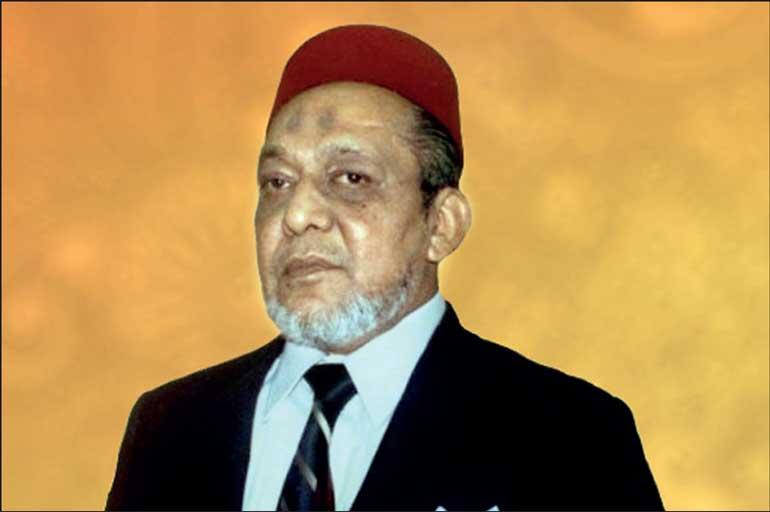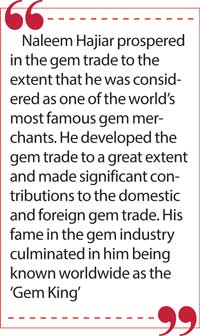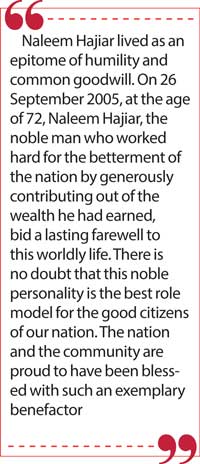Sunday Feb 22, 2026
Sunday Feb 22, 2026
Wednesday, 13 October 2021 00:00 - - {{hitsCtrl.values.hits}}

Naleem Hajiar was one of the noble personalities who worked for the national interest of Sri Lanka
Naleem Hajiar was one of the noble personalities who worked for the national interest of Sri Lanka. Born on 4 April 1933, to Muhammad Ismail and Sharifa Umma of China Fort, Beruwala, Naleem Hajiar was raised in a very poor family background, due to which he was only able to continue his schooling up to the fifth grade, and was forced to seek employment thereafter at a very early age.
Naleem Hajiar, who grew up amidst various hardships and economic constraints, began to engage from his young age in the trade of gemstones, the main industry of the people of Beruwala. Through his tireless work and perseverance, he became well versed and proficient in the gem trade.
Naleem Hajiar married Rafeeka from China Fort, Beruwala, and became the father of four boys and a girl.
Contribution to the gem industry
Naleem Hajiar prospered in the gem trade to the extent that he was considered as one of the world’s most famous gem merchants. He developed the gem trade to a great extent and made significant contributions to the domestic and foreign gem trade. His fame in the gem industry culminated in him being known worldwide as the ‘Gem King’.
gem merchants. He developed the gem trade to a great extent and made significant contributions to the domestic and foreign gem trade. His fame in the gem industry culminated in him being known worldwide as the ‘Gem King’.
It is noteworthy that Naleem Hajiar maintained a strong relationship with parties of all religious and ethnic backgrounds involved in the gem trade in Sri Lanka at that time, by asserting high trade values such as trust, honesty and integrity in the gem industry that transcends the boundaries of race, region and country.
He created a beautiful culture, wherein any of the most precious gemstones ever found in Sri Lanka would be first brought and shown to Naleem Hajiar before it was sold. Similarly, gem merchants from countries such as the United States, Britain, France, Germany, and Japan used to come to him to buy the most precious gemstones. Thus, on his own he established the gem trade between Sri Lanka and European countries and made his unique contribution to the nation. By engaging in such trade activities, he not only contributed to the international trade of Sri Lanka but also made significant contributions to the foreign exchange earnings of the country.
Beginning his gem business journey in the 1950s, he gained long-term experience, maturity and in-depth knowledge of the most intricate aspects of gemstones, such as identifying and valuing them. He not only maintained the national and international relations which were built upon the gem trade, but also made use of them for the development of the trade in Sri Lanka. He provided the Government with the necessary advice and plans to transform the trade into a lucrative sector bringing increased revenue to the nation.
In 1970, the Sri Lankan Government planned to set up the State Gem Corporation to regulate gem exports. It is noteworthy that Dr. N.M. Perera, the then Finance Minister, had two rounds of discussions with Naleem Hajiar and received valuable guidance and advice from him. In recognition of his contribution towards establishing the State Gem Corporation the Government of Sri Lanka invited Naleem Hajiar as a special guest at the official opening ceremony of the State Gem Corporation on 11 July 1972.
The fact that Naleem Hajiar himself provided the first gemstone in the history of Sri Lanka to be exported through the newly-established State Gem Corporation bears ample testimony to his interest in the growth of the Sri Lankan gem industry.
He had the opportunity to build strong relationships between gem merchants, provide them with useful advice, and share experiences and insight into the gem trade at state universities. It is to be recalled that he was the chief guest at a special session on the field of gemstones organised by the University of Moratuwa where he shared his valuable advice and ideas on how to develop the gem industry in Sri Lanka.
guest at a special session on the field of gemstones organised by the University of Moratuwa where he shared his valuable advice and ideas on how to develop the gem industry in Sri Lanka.
During the visit of Queen Elizabeth II to Sri Lanka in 1981, the then President J.R. Jayewardene was accompanied by Naleem Hajiar and other leading Sri Lankan jewellers who met the Queen at the Galle Face Hotel in Colombo. On that occasion President J.R. Jayewardene presented to the Queen the ‘Sri Lankan Blue Sapphire,’ a precious gemstone, which was gifted to the Government by prominent gem merchants such as Naleem Hajiar, Nimal Pathirana and J. Guruge. The event is an example of Naleem Hajiar’s emergence as an indispensable figure in the national mainstream of Sri Lanka.
A humble gift to the nation
Naleem Hajiar’s lifetime achievements are a unique historical testimony to the fact that he spent his hard-earned wealth for the benefit of the nation. His cooperation with the Sri Lankan Government in the face of the massive foreign exchange crisis faced by the country in the 1970s is the best evidence of his strong commitment to the nation’s interests.
In 1974, when Sri Lanka faced a very serious foreign exchange crisis, Naleem Hajiar donated his foreign exchange worth around Rs. 1.5 million to the Government to overcome the economic crisis in Sri Lanka. He handed over his contribution to the then Prime Minister Sirimavo Bandaranaike at the Prime Minister’s official residence as his ‘humble gift’ to the country’s recovery program. For the first time in the history of Sri Lanka, the gifting of foreign exchange by an ordinary citizen to the Government has been recorded as an event of historical significance.
Contribution to educational development
Naleem Hajiar has made significant contributions to the development of education. In order to improve the standard of school education he contributed towards the development of public schools by spending large sums of money on providing infrastructure facilities to schools in Kalutara and other districts. He created a generation of intellectuals with special expertise and established the higher education institute of Jamiah Naleemiah with the aim of contributing to the progress of the country. The institute was inaugurated on 9 August 1973 by the then Minister of Education, Dr. Badiudin Mahmud.
For the past five decades, the Jamiah Naleemiah higher education institute, based on the principles of Islamic studies and national higher education policies, has been making a unique contribution to nation building by producing well qualified graduates, intellectuals, Government officials and civil servants. Many academicians and dignitaries in the country have praised the institute’s educational achievements.
In 1984 Prof. D.E. Hettiarachchi praised the work of the institute, saying: “I am much impressed by the work being done in this institute. By establishing it, Naleem Hajiar has done a great service for the country and in particular for Islamic education.”
Dr. Nissanka Wijeyeratne, the former Minister of Education of Sri Lanka, visited Jamaiah Naleemiya in 1978 and said: “The excellent learning facilities and curriculum available at the institute have elevated it to the level of a higher education institution. I am very impressed by this academy.”
Former Minister of Higher Education and Highways of Sri Lanka Lakshman Kiriella recalled Naleem Hajiar’s contribution during the 10th Convocation of Jamiah Naleemiah, saying: “The work done by Naleem Hajiar in creating the Jamiah Naleemiah education institute should be engraved in the books of history in golden letters.”
The Educational Renaissance Movement was started in 1981 by Naleem Hajiar with the aim of promoting education and higher education in general, and Muslim higher education in particular. With the corporation of great community leaders of that time, such as Sir Razik Fareed, Badiudin Mahmud, M.H. Mohamed and A.C.S. Hameed, the Educational Renaissance Movement was officially launched on 14 January 1981, and was able to produce graduates and scholars of various disciplines throughout the island.
The Educational Renaissance Movement has made significant contributions to the advancement of higher education in the country by facilitating student education through qualified and experienced teachers of high educational standards, thereby helping to increase university admissions and also by awarding scholarships to students facing economic hardships and those who are unable to obtain university admission and pursue their higher studies.
Naleem Hajiar founded the Iqra Technical Institute with the aim of creating citizens who will excel in the field of technology and contribute to national development. The technical college was established in Beruwala as a milestone in the educational activities of the Renaissance Movement. The institute was inaugurated on 18 April 1992 by the then President of the country, Ranasinghe Premadasa.
Thus, Naleem Hajiar’s contribution to the field of education in Sri Lanka by establishing the Jamiah Naleemiah Institute, the Educational Renaissance Movement and the Iqra Technical Institute speaks volumes about his commitment to the nation’s progress.
Naleem Hajiar has provided financial assistance for the development of education beyond national borders, especially in India. His contributions as a Sri Lankan citizen have earned Sri Lanka good fame and reputation among other nationalities.
Naleem Hajiar was a pioneer in documenting the history of the Muslims of Sri Lanka, by means of providing substantial financial assistance for the work of compiling and documenting the history of the Muslims, thereby filling a gap that existed in the history of Sri Lanka. With the fullest corporation of Dr. M.A.M. Shukri and others, he succeeded in making a significant contribution to the systematic study of the indigenous history of Sri Lankan Muslims through the collaboration of intellectuals and experts in the field of Sri Lankan history.
Dr. Shukri summarised the various studies and findings presented during the three-day seminar held at the Jamiah Nalamiah Conference Hall in 1984, in his book titled ‘Muslims of Sri Lanka – Avenues to Antiquity’. The book launch took place on 3 April 1986 at the Bandaranaike Memorial International Hall in Colombo.
This is considered as a significant contribution to the history of the Muslims of Sri Lanka. It is noteworthy that the then President J.R. Jayewardene attended the occasion as the Chief Guest. The review of this book was delivered by Dr. Colvin R. De Silva, a renowned scholar of history in Sri Lanka. The first copy of the book was presented to the President by Naleem Hajiar.
Contribution to social development
Naleem Hajiar enjoyed helping with a sense of humanity all those who came to him for aid regardless of racial and religious differences. Many poor people from all over the country used to come to Naleem Hajiar’s house every day seeking various forms of assistance. The people bear testimony to the fact that Naleem Hajiar donated a large portion of his wealth to enrich the lives of the poor.
Similarly, among his landmark contributions to the nation of Sri Lanka is the public donation of the ‘Sucharitha’ building, which too should be historically recorded. During former President Ranasinghe Premadasa’s tenure as Minister of Local Government, Naleem Hajiar constructed for him the main building of his Sucharitha movement.
Naleem Hajiar’s role in maintaining and nurturing ethnic and religious harmony in the country is significant. He made most of his business dealings with brothers and sisters of other faiths. Naleem Hajiar showed extra zeal in maintaining peaceful coexistence in the country, respecting all races and their religious sentiments. He provided financial assistance to many places of worship in his area and in all parts of the island.
Contribution to the sports sector
Naleem Hajiar, who has contributed his wealth to many sectors of the country such as trade, education and social welfare, has also contributed to the development of the sports sector. He built playgrounds for schools nationwide and provided the necessary sports equipment. In Beruwala he set up a public playground called ‘Naleem Hajiar Stadium’. The stadium was opened in 1970 by the then Prime Minister Dudley Senanayake.
He made a significant contribution to the development of the sports sector at the national level and contributed more than Rs. 500,000 for the construction of the famous Sugathadasa Indoor Stadium in Sri Lanka. Similarly, he funded the development of the SSC sports grounds and also built a pavilion which was named as ‘Bairaha Pavilion’.
Thus, the scope of public works done by Naleem Hajiar for his country is quite vast. As a result, many honorary awards and titles were sought for him at the national level. By nature, he did not seek fame and honour and politely avoided them. When former President J.R. Jayewardene decided to appoint Naleem Hajiar as one of the members of the ‘Greater Colombo Economic Commission’ as a gesture of goodwill towards him, he politely declined, saying that he could not possibly accept it.
Naleem Hajiar also politely declined when former President Ranasinghe Premadasa expressed his desire to honour him with the highest award on the National Heroes Day.
Thus, Naleem Hajiar lived as an epitome of humility and common goodwill. On 26 September 2005, at the age of 72, Naleem Hajiar, the noble man who worked hard for the betterment of the nation by generously contributing out of the wealth he had earned, bid a lasting farewell to this worldly life. There is no doubt that this noble personality is the best role model for the good citizens of our nation. The nation and the community are proud to have been blessed with such an exemplary benefactor.
References:
1) Shukri, M.A.M., ‘Naleem Hajiar, Life and Service,’ Beruwala, Islamic Publication Bureau, Jamiah Nalmeemiah.
2) Souvenir to commemorate the felicitation of M.I.M. Naleem Hajiar, Naleem Hajiar Felicitation Committee, China Fort, Beruwala, 1998.
3) Shukri, M.A.M., ‘Muslims of Sri Lanka: Avenues to Antiquity,’ Beruwala, Jamiah Naleemiah Inst., 1986.
4) Jamaiah Nalmeemiah 10-year anniversary special supplement, Veerakesari, 10 August 1984.
5) Founder Al Haj M.I.M. Naleem, http://naleemiah.edu.lk/founder/
6) Irfan, P.M.M., ‘Naleem Hajiar, the Man who made History,’ ‘Islamic Thought,’ Issue No. 107, 2005.
7) Interviews:
a. Al-Haj Zawahir, Al-Haj Liyawudeen, Al-Haj Hamza (these personalities who are from Beruwala are contemporaries of Late Naleem Hajiar who were among those who closely associated with him). Date: 24 February 2019. Place: Residence of Al-Haj Hamza, China Fort, Beruwala.
b. Al-Haj Yakooth Naleem (youngest son of Naleem Hajiar), Date: 24 February 2019. Place: Administrative Building, Jamiah Naleemiah Institute, Beruwala.